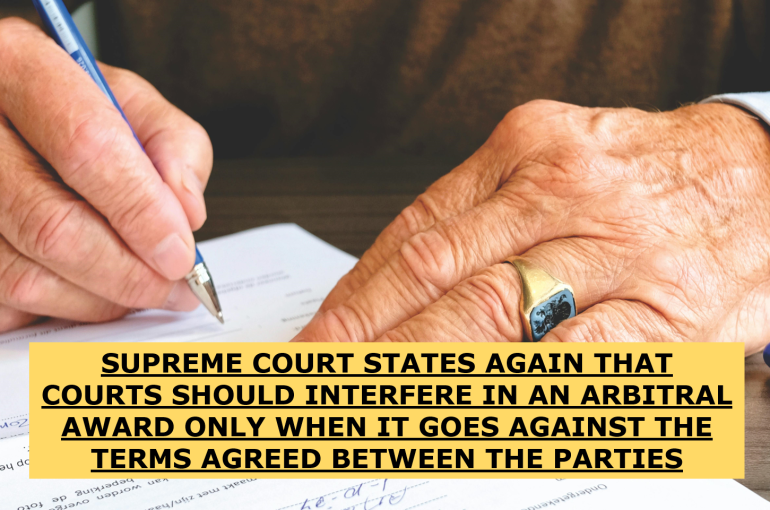SUPREME COURT STATES AGAIN THAT COURTS SHOULD INTERFERE IN AN ARBITRAL AWARD ONLY WHEN IT GOES AGAINST THE TERMS AGREED BETWEEN THE PARTIES
A two Judge Bench of the Hon’ble Supreme Court comprising of Justice Pamidighantam Sri Narasimha and Justice Pankaj Mithal passed a judgement dated 23.08.2024 in Pam Developments Private Limited V. The State of West Bengal & Anr. Civil Appeal Nos. 9781-9782 of 2024 wherein the Apex Court held that Courts must interfere in arbitral awards in a sparing manner and only set aside parts of the award if the said award is against the terms between the parties.
Facts
The Respondents issued a Notice on 08.09.2010 for inviting tenders for the construction of a road in the Purbo Medinipur District. The Appellant made an Application for Respondent’s offer and the same was accepted and the project having duration of 18 months was granted to the Appellant. The date of commencement of project was 23.12.2010.
Later, the project was completed by the Appellant but was delayed by 5 months and was completed on 09.11.2012. Following the completion of work, the Appellant raised a bill for a sum of Rs. 77,85,290/- (Rupees Seventy-Seven Lakhs, Eighty-Five Thousand, Two Hundred and Ninety only) along-with other claims due to delays allegedly caused by the Respondent. The Respondents denied its liability for the payment of any of the claims raised by the Appellant.
Subsequently, both the Parties went for Arbitration for resolving their disputes. The Ld. Arbitrator appointed by the Parties passed an Award dated 30.01.2018 for payment for a sum of Rs.1,37,25,252/- (Rupees One Crore, Thirty-Seven Lakhs, Twenty-Five Thousand, Two Hundred and Fifty-Two only) with interest in favour of the Appellant stating that there was loss business, uneconomic utilization of plant and machinery, labour charges, delayed payments etc. on the part of the Respondent. The Ld. Arbitrator divided the Claims into 7 parts in the following manner-
Claim 1: Loss of business – ₹3,87,530
Claim 2: Uneconomic utilization of plant and machinery – ₹61,22,000
Claim 3: Labour charges for uneconomical stoppage of work – ₹5,80,500
Claim 4: Interest on delayed payments of running account bills and escalation bill – ₹54,84,024
Claim 5: Escalation – ₹11,51,198
Claim 6: Interest on the awarded sum- 12% pre-award interest, 9.25% post-award interest
Claim 7: Costs – ₹4,00,000
Later, the Award was challenged by the Respondents before the Ld. District Judge under Section 34 of the Arbitration and Conciliation Act 1996 (Act) (Application for setting aside arbitral awards). The Ld. District Judge set aside the Claim No. 1 and 2.
Thus, aggrieved by the decision, the Appellant filed an Appeal bearing no. FMAT-376-2019 under Section 37 of the Act (Appealable orders) before the Calcutta High Court for setting aside the Order by the Ld. District Judge. To the contrary, the Respondents filed a cross Appeal bearing no. COT-54-2019 for setting aside rest of the claims also. The High Court of Calcutta vide judgement dated 03.06.2021 set aside the Claim Nos. 1, 3, 4 and made some modifications in Claim no. 6 but restored the Award pertaining to Claim no. 2 that was set aside by the Ld. District Judge.
The Appellant filed an Appeal in the Hon’ble Supreme Court against the Judgement dated 03.06.2021 passed by the Calcutta High Court.
Issues
a) Whether the award granted by the Arbitrator was justified and in accordance with the contractual terms and the law?
b) Whether the Calcutta High Court’s decision to set aside certain claims was valid?
Decision by the Supreme Court
The Hon’ble Supreme Court took consideration of the terms and conditions of the contract entered between the Parties. The Claim 3 was for Labour charges for uneconomical stoppage of work and the contract explicitly barred claims for idle labour and additional establishment costs. The Apex Court provided that a contract is the foundation of a legal relationship and must be adhered to. The Apex Court also stated that the Arbitrator failed to consider the ‘Special Terms and Conditions’ of the Contract and passed the impugned Award. The Apex Court upheld the decision of the Hon’ble High Court to set aside Claim No. 3.
With regard to Claim No. 4, the Hon’ble Supreme Court set aside the judgement passed by the High Court of Calcutta on the grounds that the High Court exceeded its jurisdiction by re-evaluating the facts and the Contract between the Parties does not prohibit payment of interest. Thus, the District Court’s decision was upheld by the Apex Court.
Moreover, with regard to Claim no. 6, the Apex Court held that High Court had no reason to interfere with the Arbitral Award providing pre-reference interest to the Appellant because it was not prohibited as per the Contract between the Appellant and Respondent.
Thus, the Hon’ble Supreme Court-
1) Upheld the decision of the Hon’ble High Court in setting aside the Claim No. 3.
2) Allowed the Appeal and set aside the judgement passed by the Hon’ble High Court in respect of Claim No. 4 and 6
Conclusion:
The Apex Court partly allowed the Appeal by restoring the Awards for Claims Nos. 4 and 6 while upholding the High Court’s decision to set aside Claim No. 3. The judgement also placed reliance on adhering to the contractual obligations between the parties and how the scope of judicial interference must be limited in the matters of challenging Arbitral Awards.
Arjav Jain
Legal Associate
The Indian Lawyer





































Leave a Reply